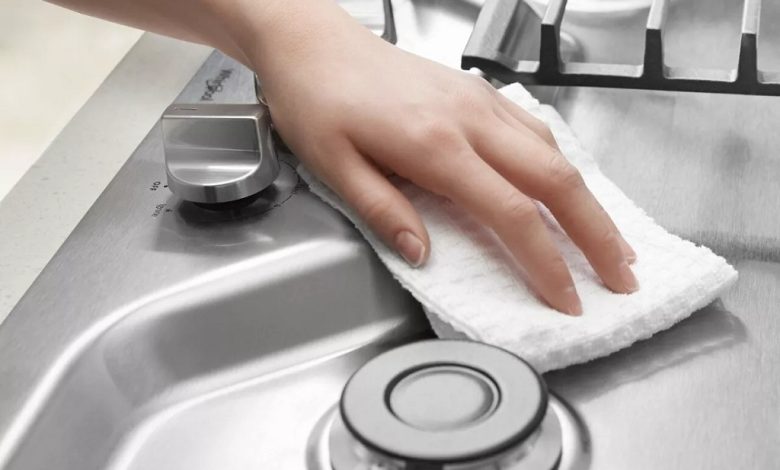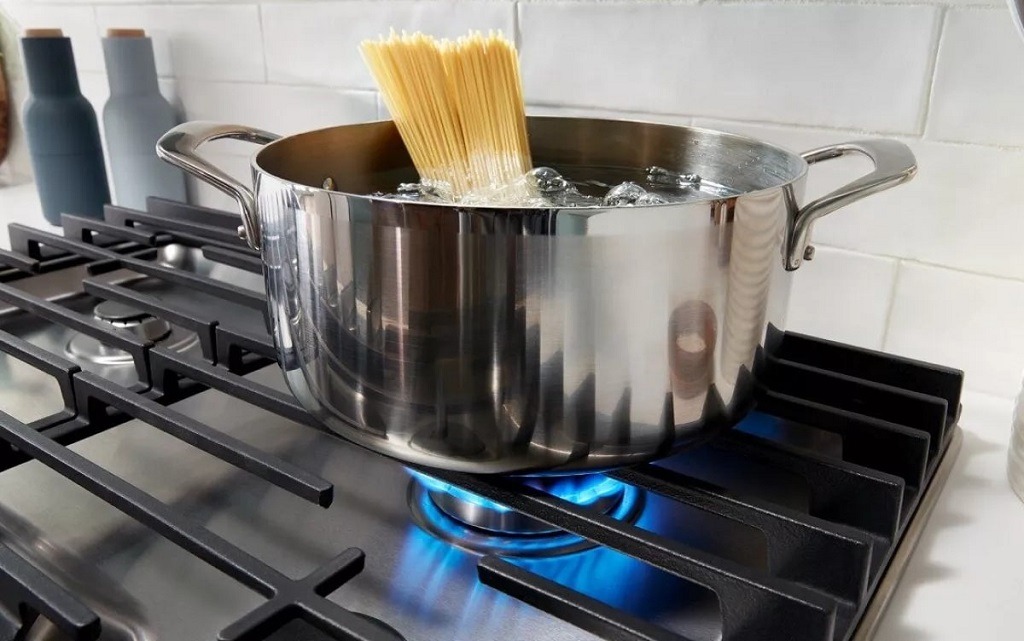Best Methods for Removing Hard Water Stains From a Stainless Steel Stovetop

A stainless steel stovetop is the centerpiece of many kitchens, combining elegance with durability. However, hard water stains can ruin that polished, modern look, creating an unsightly, cloudy residue. While stainless steel is relatively low-maintenance, these stubborn stains require specific cleaning techniques to preserve its luster.
Hard water, rich in minerals like calcium and magnesium, often leaves behind deposits that bond with surfaces, including stainless steel. Ignoring them for too long can make them harder to remove and damage your stovetop’s finish over time. In this guide, we’ll explore proven solutions to eliminate hard water stains while maintaining the integrity of your stovetop. Before we dive in, explore Firstgradeappliances for more kitchen care tips and appliances that make your life easier.
Understanding Hard Water Stains on Stainless Steel

Hard water stains occur when water evaporates, leaving behind minerals that crystallize and adhere to surfaces. Stainless steel is particularly prone to these deposits due to its smooth finish. Over time, these minerals bond tightly to the surface, forming whitish or chalky stains.
Stains can become more pronounced when the stovetop is exposed to high heat, as heat accelerates the water evaporation process. Additionally, stainless steel’s sleek surface reflects light, making any imperfections more noticeable. Understanding the science behind these stains is key to tackling them effectively.
The Importance of Regular Maintenance
Prevention is the best cure when it comes to hard water stains. Cleaning your stovetop regularly not only keeps it sparkling but also prevents mineral deposits from building up. While some might think stainless steel is invincible, improper care can lead to discoloration and even corrosion.
By wiping down your stovetop daily and promptly cleaning any spills, you can significantly reduce the likelihood of stains forming. Also, using distilled water for cleaning instead of tap water can help minimize mineral buildup over time. Click on https://firstgradeappliances.com/what-happens-when-you-turn-on-an-electric-stove-burner/ for valuable insights on how electric stove burners work and tips for maintaining them safely.
Best Household Items to Remove Hard Water Stains
Sometimes, you don’t need expensive commercial cleaners to solve the problem. Household staples like vinegar, baking soda, and lemon juice can work wonders in removing hard water stains from your stainless steel stovetop.
White Vinegar Solution
White vinegar is a natural descaler and works well against mineral deposits. Here’s how to use it:
- Mix equal parts of white vinegar and warm water in a spray bottle.
- Spray the solution generously over the stained areas.
- Let it sit for 5-10 minutes to dissolve the minerals.
- Wipe with a soft microfiber cloth, rinsing thoroughly afterward.
Baking Soda Paste
Baking soda is a gentle abrasive that can break down stains without scratching the surface.
- Mix three tablespoons of baking soda with one tablespoon of water to create a thick paste.
- Apply the paste to the stained areas using a soft sponge.
- Rub gently in circular motions and wipe clean with a damp cloth.
Lemon Juice for Stubborn Stains
The citric acid in lemon juice is effective at dissolving tough stains.
- Squeeze fresh lemon juice onto a cloth or directly on the stain.
- Let it sit for a few minutes before scrubbing lightly.
- Rinse and dry with a clean microfiber cloth.
Commercial Cleaners for Hard Water Stains
If household solutions don’t cut it, there are plenty of stainless steel-friendly cleaners available. Look for products specifically labeled as safe for stainless steel and hard water stains. Popular options include:
- Bar Keepers Friend: This cleaner contains oxalic acid, which is excellent for tough stains.
- Weiman Stainless Steel Cleaner: It’s designed to clean and polish stainless steel surfaces while protecting against future stains.
Always test a small, inconspicuous area before applying any commercial cleaner to the entire surface.
Techniques to Avoid When Cleaning Stainless Steel
Cleaning stainless steel improperly can do more harm than good. Here are some things you should avoid:
- Using Steel Wool or Abrasive Pads: These can scratch and permanently damage the surface.
- Applying Bleach or Chlorine-based Cleaners: These chemicals can cause discoloration and corrosion.
- Cleaning Against the Grain: Always clean in the direction of the grain to avoid streaking and scratches.
- Skipping the Drying Step: Allowing water to air dry can lead to more hard water stains. Always dry your stovetop with a microfiber cloth after cleaning.
How to Restore Shine After Cleaning
Once the hard water stains are gone, restoring your stainless steel stovetop’s original shine is the final step. Use olive oil or a stainless steel polish to buff the surface:
- Dab a small amount of olive oil onto a soft cloth.
- Rub the cloth over the surface in the direction of the grain.
- Buff until the surface shines.
Alternatively, stainless steel polishes not only enhance the appearance but also provide a protective layer against future stains.
Can Hard Water Stains Damage Stainless Steel Over Time?
Yes, if left untreated, hard water stains can etch into the stainless steel, causing permanent damage. The minerals in hard water, combined with heat, can create microscopic scratches that dull the surface. Over time, this can compromise the protective chromium oxide layer that prevents rust and corrosion, leading to further degradation.
Preventive care and prompt cleaning are crucial to maintaining the long-term beauty and functionality of your stovetop.
Pro Tips for Cleaning Stainless Steel Stovetops
- Use a microfiber cloth for all cleaning and drying to avoid streaks and scratches.
- Work in small sections to ensure thorough cleaning.
- Keep your stovetop covered when not in use to reduce exposure to hard water droplets.
- Always read appliance manuals for cleaning recommendations specific to your stovetop model.
The Role of Water Softeners in Reducing Hard Water Stains
Installing a water softener can dramatically reduce the mineral content in your water, preventing hard water stains from forming in the first place. Water softeners work by replacing calcium and magnesium ions with sodium ions, softening the water and making it less likely to leave behind residue.
While this solution requires an upfront investment, it can save you significant time and effort in cleaning over the long term.
Read More Also: Protecting Floor Edges From Damage Caused by Moving Heavy Floor Plants
FAQs
What causes hard water stains on stainless steel stovetops?
Hard water stains result from evaporated water leaving behind mineral deposits, primarily calcium and magnesium, that adhere to the stovetop’s surface.
Can vinegar damage stainless steel?
No, vinegar is safe for stainless steel when used in moderation. However, prolonged exposure can cause dullness, so rinse and dry the surface thoroughly after cleaning.
How often should I clean my stainless steel stovetop?
It’s best to clean your stovetop daily and deep clean weekly to prevent hard water stains and buildup.
How long does it take for an electric stove to catch fire?
While rare, improper cleaning or buildup of grease and debris can increase the risk of a fire. Regular maintenance and prompt cleaning help mitigate this risk.
Can I use dish soap to clean stainless steel?
Yes, mild dish soap mixed with warm water is an effective solution for routine cleaning. Avoid harsh detergents or those with added bleach.
Conclusion
Hard water stains on a stainless steel stovetop can be a persistent nuisance, but with the right methods and tools, they are entirely manageable. From household staples like vinegar and baking soda to commercial cleaners, there’s a solution for every level of stain. By taking preventative steps and maintaining a regular cleaning routine, you can keep your stainless steel stovetop gleaming for years to come.



